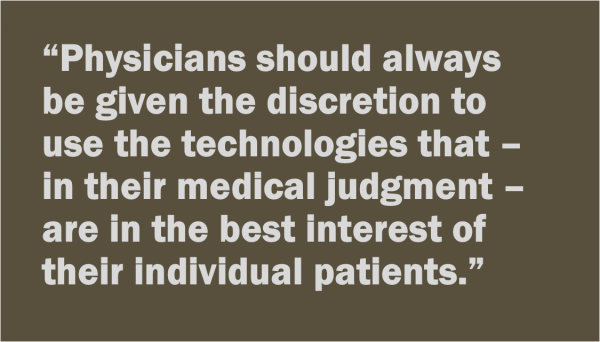PERSPECTIVE: Don’t Block Emerging Technologies, Consumer Choice in Eye Care
/by Gary D. LeBeau
With the advent of e-commerce and new technologies involving telemedicine, the healthcare industry is transforming and is now giving consumers greater freedom than ever before. More and more consumers are receiving their health care and health products in new ways and the Internet has been a huge asset in lowering prices, increasing access and helping working families get what they need even outside of so-called “regular” business hours. This convenience is quickly becoming a necessity in today’s world.
For example, federal law states that patients can leave their eye doctor’s office with a copy of their prescription, giving them the choice of how they will fill it. Whether it’s through their desktop computers, an app on their mobile device or tablet, through the mail, or at a discount retailer, the choice is up to the patient to decide in consultation with their doctor.
These innovations, however, create new challenges in the legal, legislative, and regulatory arenas, as established providers often seek to restrict competition and protect their market share from emerging threats. . This has been especially evident in the contact lens market, which has been repeatedly targeted by protectionist legislation that ignores the reality of modern day technologies in telemedicine.
Proposed legislation frequently uses “protecting public health” as a rationale for restricting the use of new technology in eye care. In fact, there is not a single reported instance of a patient being harmed using these new technologies and there are multiple tools used to screen patients and direct them to a medical provider when appropriate. In addition, physicians should always be given the discretion to use the technologies that – in their medical judgment – are in the best interest of their individual patients.
 Here in Connecticut, H.B. 6012, An Act Concerning Consumer Protection in Eye Care, looks to amend general statues to require various mandates on industry and requirements for consumers before permitting a remote or in-person eye assessment using automated equipment or an application designed to be used on a telephone, computer or Internet-based mobile device. If enacted, this legislation will make Connecticut stand alone as the state with the most stringent restrictions on consumer choice. Other states, including Virginia, have recently passed legislation going in the opposite direction to specifically allow the use of this ocular technology.
Here in Connecticut, H.B. 6012, An Act Concerning Consumer Protection in Eye Care, looks to amend general statues to require various mandates on industry and requirements for consumers before permitting a remote or in-person eye assessment using automated equipment or an application designed to be used on a telephone, computer or Internet-based mobile device. If enacted, this legislation will make Connecticut stand alone as the state with the most stringent restrictions on consumer choice. Other states, including Virginia, have recently passed legislation going in the opposite direction to specifically allow the use of this ocular technology.
Connecticut Legislators should resist attempts to stifle innovation and prevent consumers from making their own decisions. Connecticut should not place itself at a competitive disadvantage with other states when it comes to emerging technologies and innovation in the health care sector.
____________________________
Gary D. LeBeau was a Connecticut state representative (1991- 1995) and a state senator (1997-2015) during which time he served as co-chair of the Commerce Committee. He also served as co-chair of the National Council of State Legislators Commerce and Labor Committee from 2010 to 2014 and first chairperson of the state legislature’s Manufacturing Caucus, 2012-2015.






























